Performance Measurement and Decentralization: An Overview Report
VerifiedAdded on 2020/05/04
|9
|3721
|122
Report
AI Summary
This report provides a comprehensive overview of decentralization and its relationship to performance measurement within organizations. It begins by defining decentralization and its importance, especially in large-scale operations, and then explores the impact on managerial accounting. The report delves into both financial and non-financial performance measures, including quality cost, variances, cash flow, and working capital, as well as performance management systems like the balanced scorecard, action-profit linkage model, and performance prism. It analyzes how decentralization affects decision-making quality and the accuracy of financial statements, highlighting both the advantages, such as freeing up senior executives and enabling contextual decisions, and the disadvantages, such as potential coordination issues and the risk of decisions based on personal interests. The report concludes by emphasizing the importance of performance measurement systems to ensure the effectiveness of decentralization, and discusses the research methodology including survey methods and target participants. This analysis underscores the critical role of performance measurement in maximizing the benefits of decentralization within an organization.
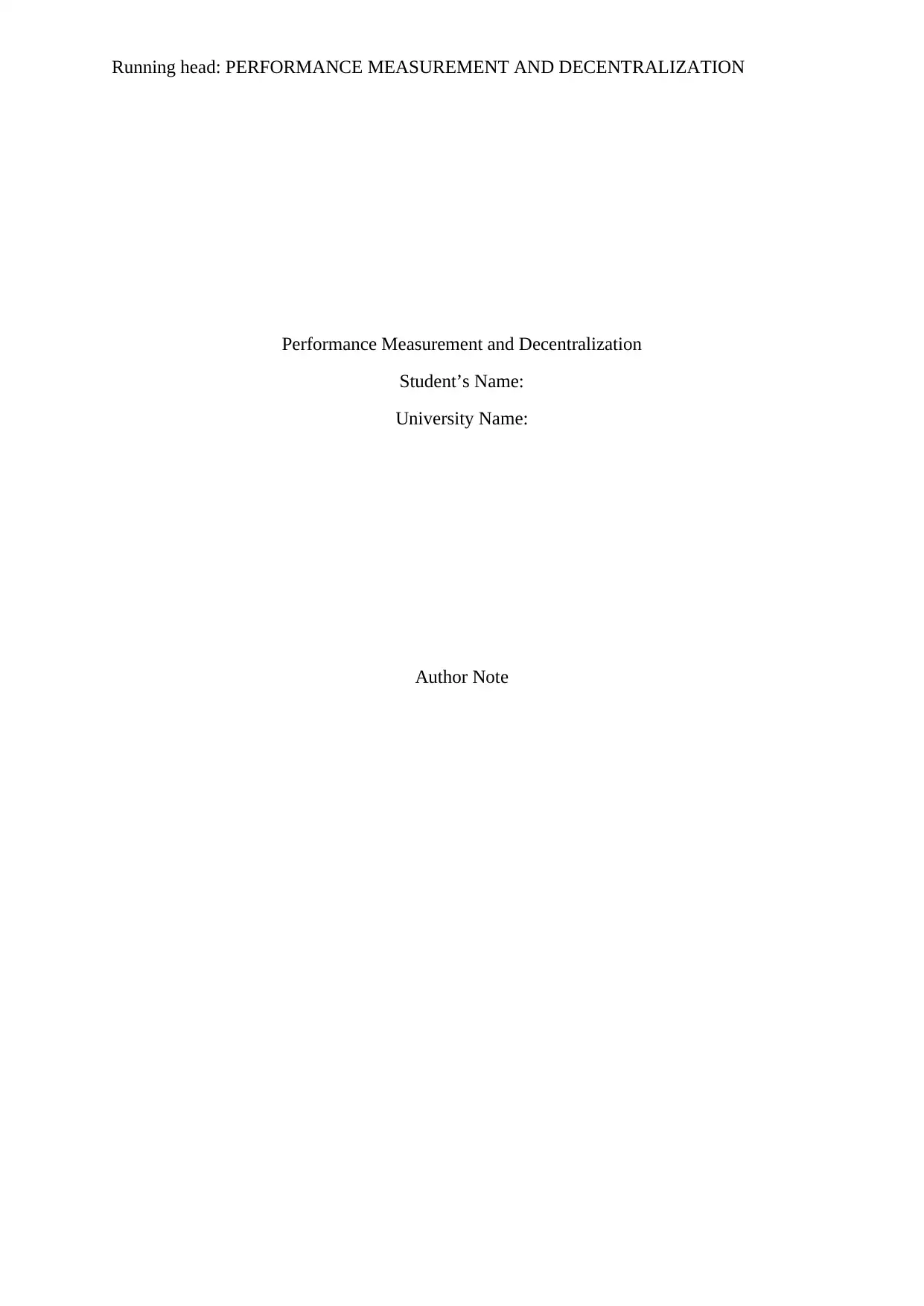
Running head: PERFORMANCE MEASUREMENT AND DECENTRALIZATION
Performance Measurement and Decentralization
Student’s Name:
University Name:
Author Note
Performance Measurement and Decentralization
Student’s Name:
University Name:
Author Note
Paraphrase This Document
Need a fresh take? Get an instant paraphrase of this document with our AI Paraphraser
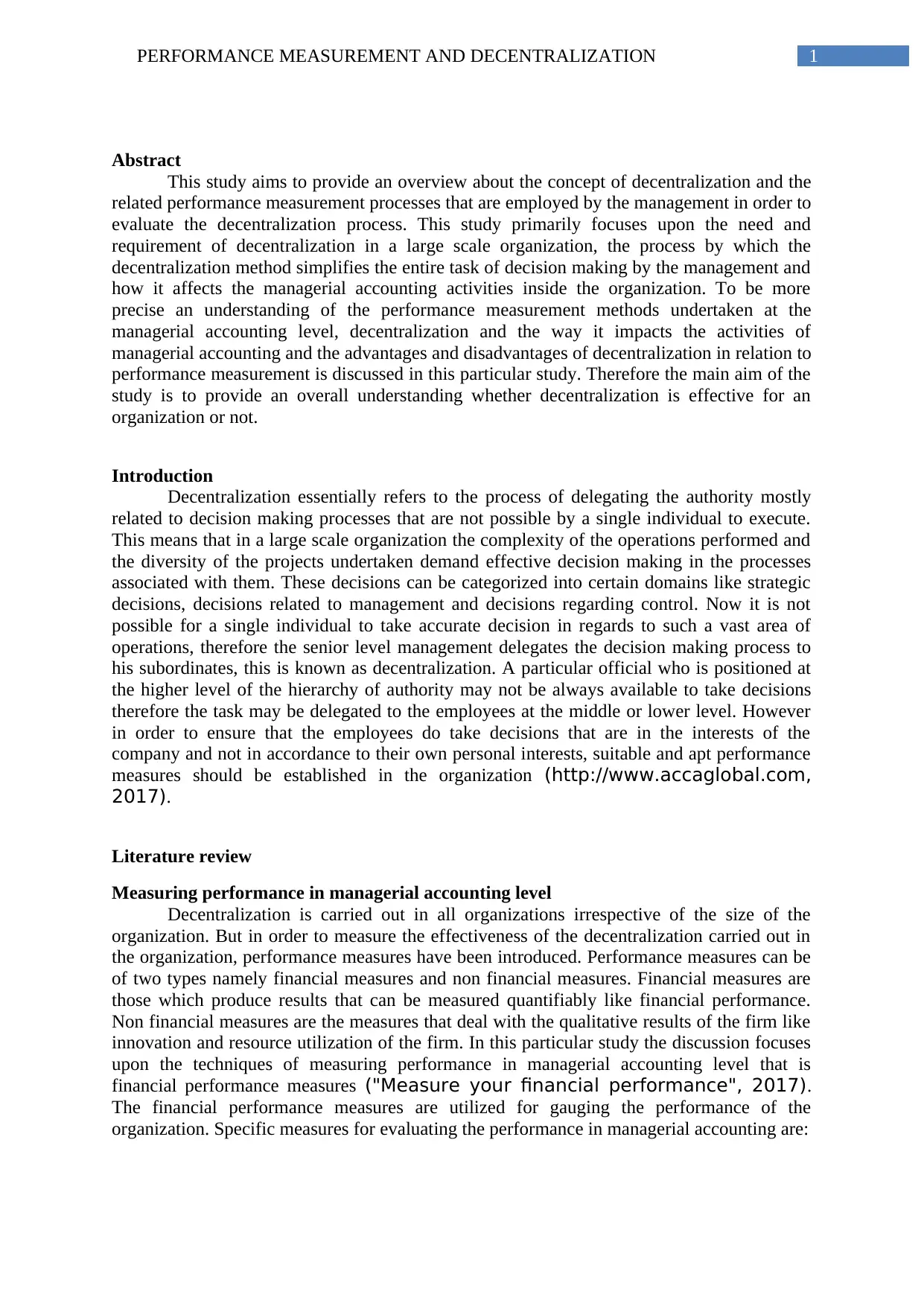
1PERFORMANCE MEASUREMENT AND DECENTRALIZATION
Abstract
This study aims to provide an overview about the concept of decentralization and the
related performance measurement processes that are employed by the management in order to
evaluate the decentralization process. This study primarily focuses upon the need and
requirement of decentralization in a large scale organization, the process by which the
decentralization method simplifies the entire task of decision making by the management and
how it affects the managerial accounting activities inside the organization. To be more
precise an understanding of the performance measurement methods undertaken at the
managerial accounting level, decentralization and the way it impacts the activities of
managerial accounting and the advantages and disadvantages of decentralization in relation to
performance measurement is discussed in this particular study. Therefore the main aim of the
study is to provide an overall understanding whether decentralization is effective for an
organization or not.
Introduction
Decentralization essentially refers to the process of delegating the authority mostly
related to decision making processes that are not possible by a single individual to execute.
This means that in a large scale organization the complexity of the operations performed and
the diversity of the projects undertaken demand effective decision making in the processes
associated with them. These decisions can be categorized into certain domains like strategic
decisions, decisions related to management and decisions regarding control. Now it is not
possible for a single individual to take accurate decision in regards to such a vast area of
operations, therefore the senior level management delegates the decision making process to
his subordinates, this is known as decentralization. A particular official who is positioned at
the higher level of the hierarchy of authority may not be always available to take decisions
therefore the task may be delegated to the employees at the middle or lower level. However
in order to ensure that the employees do take decisions that are in the interests of the
company and not in accordance to their own personal interests, suitable and apt performance
measures should be established in the organization (http://www.accaglobal.com,
2017).
Literature review
Measuring performance in managerial accounting level
Decentralization is carried out in all organizations irrespective of the size of the
organization. But in order to measure the effectiveness of the decentralization carried out in
the organization, performance measures have been introduced. Performance measures can be
of two types namely financial measures and non financial measures. Financial measures are
those which produce results that can be measured quantifiably like financial performance.
Non financial measures are the measures that deal with the qualitative results of the firm like
innovation and resource utilization of the firm. In this particular study the discussion focuses
upon the techniques of measuring performance in managerial accounting level that is
financial performance measures ("Measure your financial performance", 2017).
The financial performance measures are utilized for gauging the performance of the
organization. Specific measures for evaluating the performance in managerial accounting are:
Abstract
This study aims to provide an overview about the concept of decentralization and the
related performance measurement processes that are employed by the management in order to
evaluate the decentralization process. This study primarily focuses upon the need and
requirement of decentralization in a large scale organization, the process by which the
decentralization method simplifies the entire task of decision making by the management and
how it affects the managerial accounting activities inside the organization. To be more
precise an understanding of the performance measurement methods undertaken at the
managerial accounting level, decentralization and the way it impacts the activities of
managerial accounting and the advantages and disadvantages of decentralization in relation to
performance measurement is discussed in this particular study. Therefore the main aim of the
study is to provide an overall understanding whether decentralization is effective for an
organization or not.
Introduction
Decentralization essentially refers to the process of delegating the authority mostly
related to decision making processes that are not possible by a single individual to execute.
This means that in a large scale organization the complexity of the operations performed and
the diversity of the projects undertaken demand effective decision making in the processes
associated with them. These decisions can be categorized into certain domains like strategic
decisions, decisions related to management and decisions regarding control. Now it is not
possible for a single individual to take accurate decision in regards to such a vast area of
operations, therefore the senior level management delegates the decision making process to
his subordinates, this is known as decentralization. A particular official who is positioned at
the higher level of the hierarchy of authority may not be always available to take decisions
therefore the task may be delegated to the employees at the middle or lower level. However
in order to ensure that the employees do take decisions that are in the interests of the
company and not in accordance to their own personal interests, suitable and apt performance
measures should be established in the organization (http://www.accaglobal.com,
2017).
Literature review
Measuring performance in managerial accounting level
Decentralization is carried out in all organizations irrespective of the size of the
organization. But in order to measure the effectiveness of the decentralization carried out in
the organization, performance measures have been introduced. Performance measures can be
of two types namely financial measures and non financial measures. Financial measures are
those which produce results that can be measured quantifiably like financial performance.
Non financial measures are the measures that deal with the qualitative results of the firm like
innovation and resource utilization of the firm. In this particular study the discussion focuses
upon the techniques of measuring performance in managerial accounting level that is
financial performance measures ("Measure your financial performance", 2017).
The financial performance measures are utilized for gauging the performance of the
organization. Specific measures for evaluating the performance in managerial accounting are:
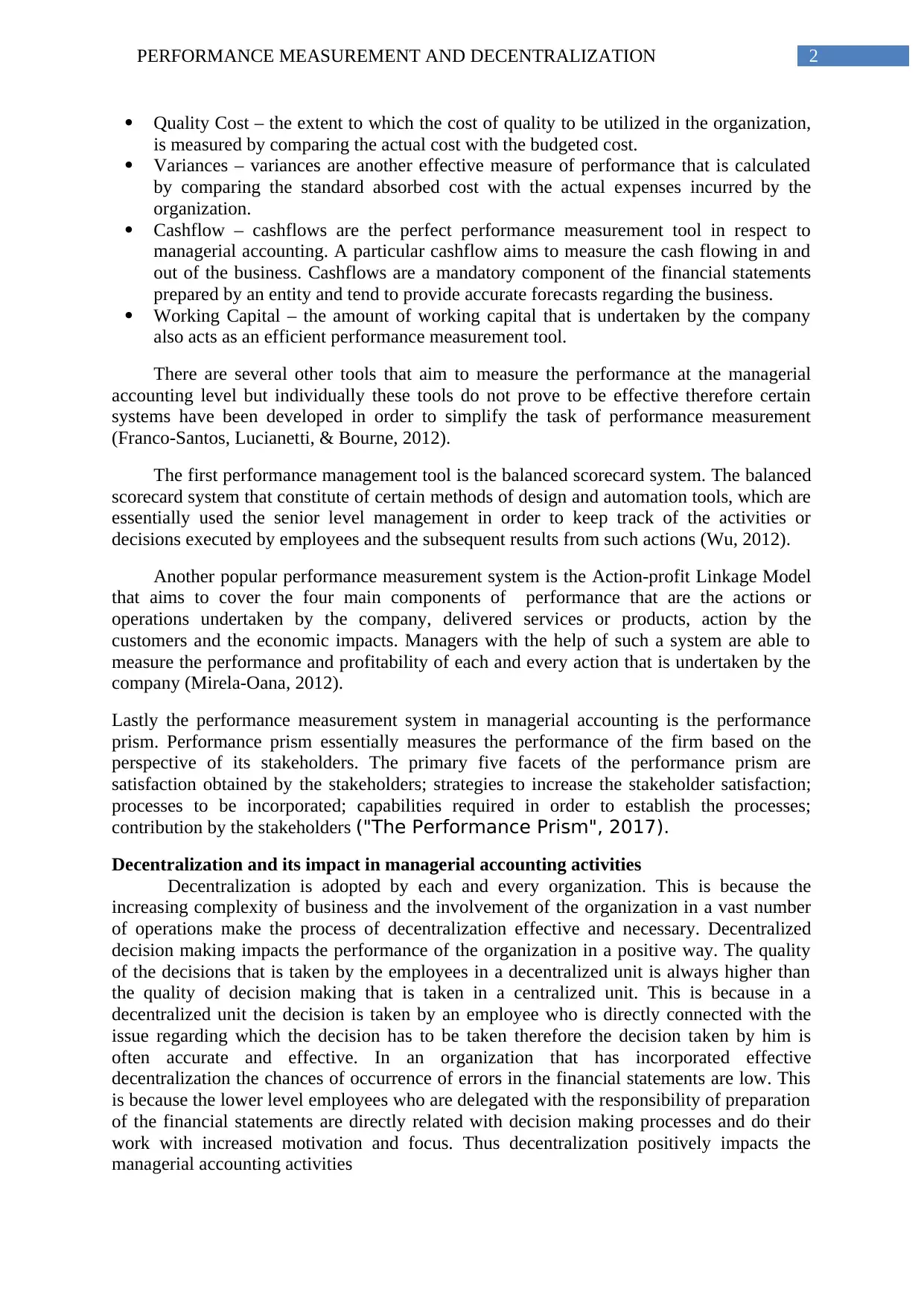
2PERFORMANCE MEASUREMENT AND DECENTRALIZATION
Quality Cost – the extent to which the cost of quality to be utilized in the organization,
is measured by comparing the actual cost with the budgeted cost.
Variances – variances are another effective measure of performance that is calculated
by comparing the standard absorbed cost with the actual expenses incurred by the
organization.
Cashflow – cashflows are the perfect performance measurement tool in respect to
managerial accounting. A particular cashflow aims to measure the cash flowing in and
out of the business. Cashflows are a mandatory component of the financial statements
prepared by an entity and tend to provide accurate forecasts regarding the business.
Working Capital – the amount of working capital that is undertaken by the company
also acts as an efficient performance measurement tool.
There are several other tools that aim to measure the performance at the managerial
accounting level but individually these tools do not prove to be effective therefore certain
systems have been developed in order to simplify the task of performance measurement
(Franco-Santos, Lucianetti, & Bourne, 2012).
The first performance management tool is the balanced scorecard system. The balanced
scorecard system that constitute of certain methods of design and automation tools, which are
essentially used the senior level management in order to keep track of the activities or
decisions executed by employees and the subsequent results from such actions (Wu, 2012).
Another popular performance measurement system is the Action-profit Linkage Model
that aims to cover the four main components of performance that are the actions or
operations undertaken by the company, delivered services or products, action by the
customers and the economic impacts. Managers with the help of such a system are able to
measure the performance and profitability of each and every action that is undertaken by the
company (Mirela-Oana, 2012).
Lastly the performance measurement system in managerial accounting is the performance
prism. Performance prism essentially measures the performance of the firm based on the
perspective of its stakeholders. The primary five facets of the performance prism are
satisfaction obtained by the stakeholders; strategies to increase the stakeholder satisfaction;
processes to be incorporated; capabilities required in order to establish the processes;
contribution by the stakeholders ("The Performance Prism", 2017).
Decentralization and its impact in managerial accounting activities
Decentralization is adopted by each and every organization. This is because the
increasing complexity of business and the involvement of the organization in a vast number
of operations make the process of decentralization effective and necessary. Decentralized
decision making impacts the performance of the organization in a positive way. The quality
of the decisions that is taken by the employees in a decentralized unit is always higher than
the quality of decision making that is taken in a centralized unit. This is because in a
decentralized unit the decision is taken by an employee who is directly connected with the
issue regarding which the decision has to be taken therefore the decision taken by him is
often accurate and effective. In an organization that has incorporated effective
decentralization the chances of occurrence of errors in the financial statements are low. This
is because the lower level employees who are delegated with the responsibility of preparation
of the financial statements are directly related with decision making processes and do their
work with increased motivation and focus. Thus decentralization positively impacts the
managerial accounting activities
Quality Cost – the extent to which the cost of quality to be utilized in the organization,
is measured by comparing the actual cost with the budgeted cost.
Variances – variances are another effective measure of performance that is calculated
by comparing the standard absorbed cost with the actual expenses incurred by the
organization.
Cashflow – cashflows are the perfect performance measurement tool in respect to
managerial accounting. A particular cashflow aims to measure the cash flowing in and
out of the business. Cashflows are a mandatory component of the financial statements
prepared by an entity and tend to provide accurate forecasts regarding the business.
Working Capital – the amount of working capital that is undertaken by the company
also acts as an efficient performance measurement tool.
There are several other tools that aim to measure the performance at the managerial
accounting level but individually these tools do not prove to be effective therefore certain
systems have been developed in order to simplify the task of performance measurement
(Franco-Santos, Lucianetti, & Bourne, 2012).
The first performance management tool is the balanced scorecard system. The balanced
scorecard system that constitute of certain methods of design and automation tools, which are
essentially used the senior level management in order to keep track of the activities or
decisions executed by employees and the subsequent results from such actions (Wu, 2012).
Another popular performance measurement system is the Action-profit Linkage Model
that aims to cover the four main components of performance that are the actions or
operations undertaken by the company, delivered services or products, action by the
customers and the economic impacts. Managers with the help of such a system are able to
measure the performance and profitability of each and every action that is undertaken by the
company (Mirela-Oana, 2012).
Lastly the performance measurement system in managerial accounting is the performance
prism. Performance prism essentially measures the performance of the firm based on the
perspective of its stakeholders. The primary five facets of the performance prism are
satisfaction obtained by the stakeholders; strategies to increase the stakeholder satisfaction;
processes to be incorporated; capabilities required in order to establish the processes;
contribution by the stakeholders ("The Performance Prism", 2017).
Decentralization and its impact in managerial accounting activities
Decentralization is adopted by each and every organization. This is because the
increasing complexity of business and the involvement of the organization in a vast number
of operations make the process of decentralization effective and necessary. Decentralized
decision making impacts the performance of the organization in a positive way. The quality
of the decisions that is taken by the employees in a decentralized unit is always higher than
the quality of decision making that is taken in a centralized unit. This is because in a
decentralized unit the decision is taken by an employee who is directly connected with the
issue regarding which the decision has to be taken therefore the decision taken by him is
often accurate and effective. In an organization that has incorporated effective
decentralization the chances of occurrence of errors in the financial statements are low. This
is because the lower level employees who are delegated with the responsibility of preparation
of the financial statements are directly related with decision making processes and do their
work with increased motivation and focus. Thus decentralization positively impacts the
managerial accounting activities
⊘ This is a preview!⊘
Do you want full access?
Subscribe today to unlock all pages.

Trusted by 1+ million students worldwide
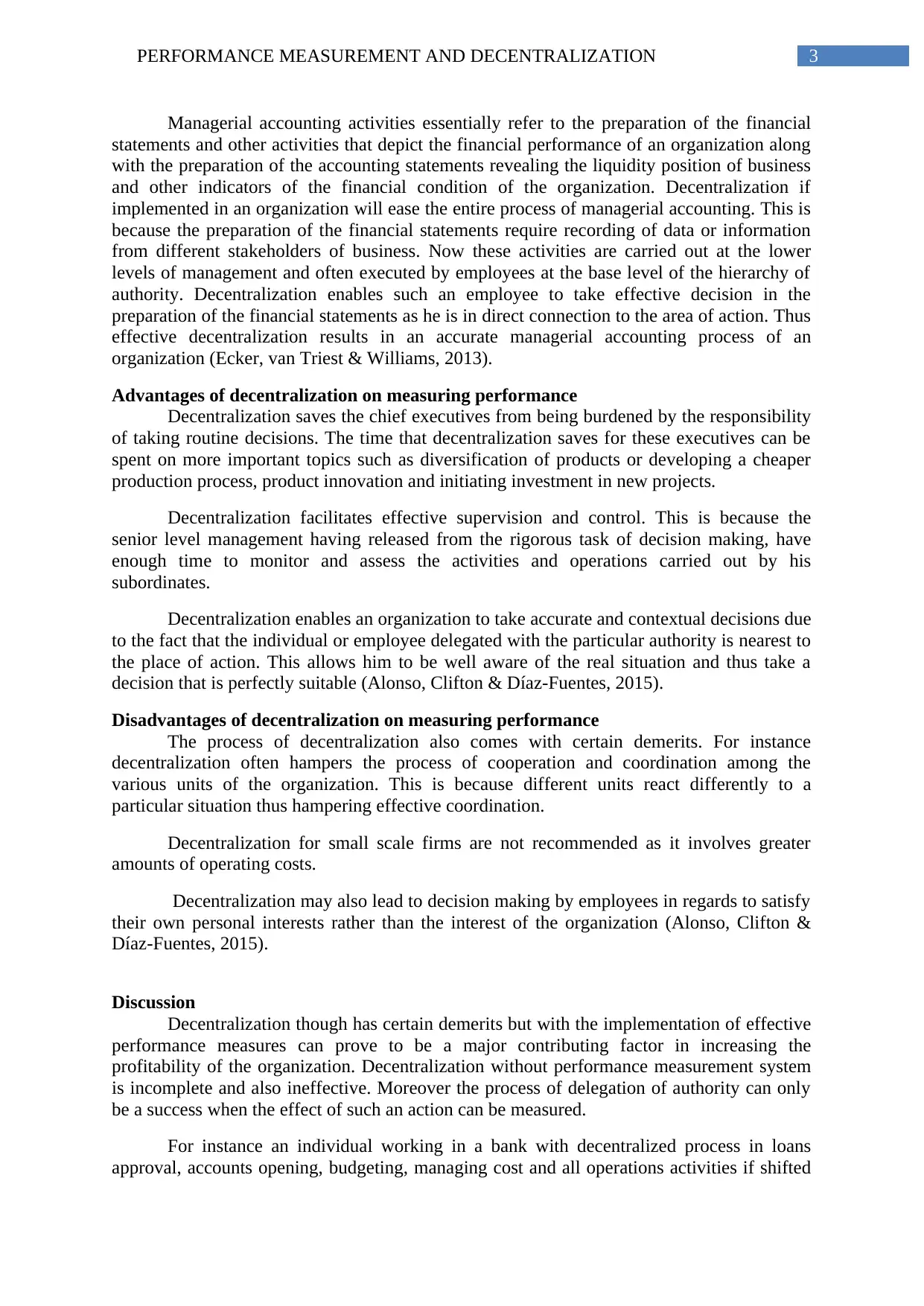
3PERFORMANCE MEASUREMENT AND DECENTRALIZATION
Managerial accounting activities essentially refer to the preparation of the financial
statements and other activities that depict the financial performance of an organization along
with the preparation of the accounting statements revealing the liquidity position of business
and other indicators of the financial condition of the organization. Decentralization if
implemented in an organization will ease the entire process of managerial accounting. This is
because the preparation of the financial statements require recording of data or information
from different stakeholders of business. Now these activities are carried out at the lower
levels of management and often executed by employees at the base level of the hierarchy of
authority. Decentralization enables such an employee to take effective decision in the
preparation of the financial statements as he is in direct connection to the area of action. Thus
effective decentralization results in an accurate managerial accounting process of an
organization (Ecker, van Triest & Williams, 2013).
Advantages of decentralization on measuring performance
Decentralization saves the chief executives from being burdened by the responsibility
of taking routine decisions. The time that decentralization saves for these executives can be
spent on more important topics such as diversification of products or developing a cheaper
production process, product innovation and initiating investment in new projects.
Decentralization facilitates effective supervision and control. This is because the
senior level management having released from the rigorous task of decision making, have
enough time to monitor and assess the activities and operations carried out by his
subordinates.
Decentralization enables an organization to take accurate and contextual decisions due
to the fact that the individual or employee delegated with the particular authority is nearest to
the place of action. This allows him to be well aware of the real situation and thus take a
decision that is perfectly suitable (Alonso, Clifton & Díaz-Fuentes, 2015).
Disadvantages of decentralization on measuring performance
The process of decentralization also comes with certain demerits. For instance
decentralization often hampers the process of cooperation and coordination among the
various units of the organization. This is because different units react differently to a
particular situation thus hampering effective coordination.
Decentralization for small scale firms are not recommended as it involves greater
amounts of operating costs.
Decentralization may also lead to decision making by employees in regards to satisfy
their own personal interests rather than the interest of the organization (Alonso, Clifton &
Díaz-Fuentes, 2015).
Discussion
Decentralization though has certain demerits but with the implementation of effective
performance measures can prove to be a major contributing factor in increasing the
profitability of the organization. Decentralization without performance measurement system
is incomplete and also ineffective. Moreover the process of delegation of authority can only
be a success when the effect of such an action can be measured.
For instance an individual working in a bank with decentralized process in loans
approval, accounts opening, budgeting, managing cost and all operations activities if shifted
Managerial accounting activities essentially refer to the preparation of the financial
statements and other activities that depict the financial performance of an organization along
with the preparation of the accounting statements revealing the liquidity position of business
and other indicators of the financial condition of the organization. Decentralization if
implemented in an organization will ease the entire process of managerial accounting. This is
because the preparation of the financial statements require recording of data or information
from different stakeholders of business. Now these activities are carried out at the lower
levels of management and often executed by employees at the base level of the hierarchy of
authority. Decentralization enables such an employee to take effective decision in the
preparation of the financial statements as he is in direct connection to the area of action. Thus
effective decentralization results in an accurate managerial accounting process of an
organization (Ecker, van Triest & Williams, 2013).
Advantages of decentralization on measuring performance
Decentralization saves the chief executives from being burdened by the responsibility
of taking routine decisions. The time that decentralization saves for these executives can be
spent on more important topics such as diversification of products or developing a cheaper
production process, product innovation and initiating investment in new projects.
Decentralization facilitates effective supervision and control. This is because the
senior level management having released from the rigorous task of decision making, have
enough time to monitor and assess the activities and operations carried out by his
subordinates.
Decentralization enables an organization to take accurate and contextual decisions due
to the fact that the individual or employee delegated with the particular authority is nearest to
the place of action. This allows him to be well aware of the real situation and thus take a
decision that is perfectly suitable (Alonso, Clifton & Díaz-Fuentes, 2015).
Disadvantages of decentralization on measuring performance
The process of decentralization also comes with certain demerits. For instance
decentralization often hampers the process of cooperation and coordination among the
various units of the organization. This is because different units react differently to a
particular situation thus hampering effective coordination.
Decentralization for small scale firms are not recommended as it involves greater
amounts of operating costs.
Decentralization may also lead to decision making by employees in regards to satisfy
their own personal interests rather than the interest of the organization (Alonso, Clifton &
Díaz-Fuentes, 2015).
Discussion
Decentralization though has certain demerits but with the implementation of effective
performance measures can prove to be a major contributing factor in increasing the
profitability of the organization. Decentralization without performance measurement system
is incomplete and also ineffective. Moreover the process of delegation of authority can only
be a success when the effect of such an action can be measured.
For instance an individual working in a bank with decentralized process in loans
approval, accounts opening, budgeting, managing cost and all operations activities if shifted
Paraphrase This Document
Need a fresh take? Get an instant paraphrase of this document with our AI Paraphraser
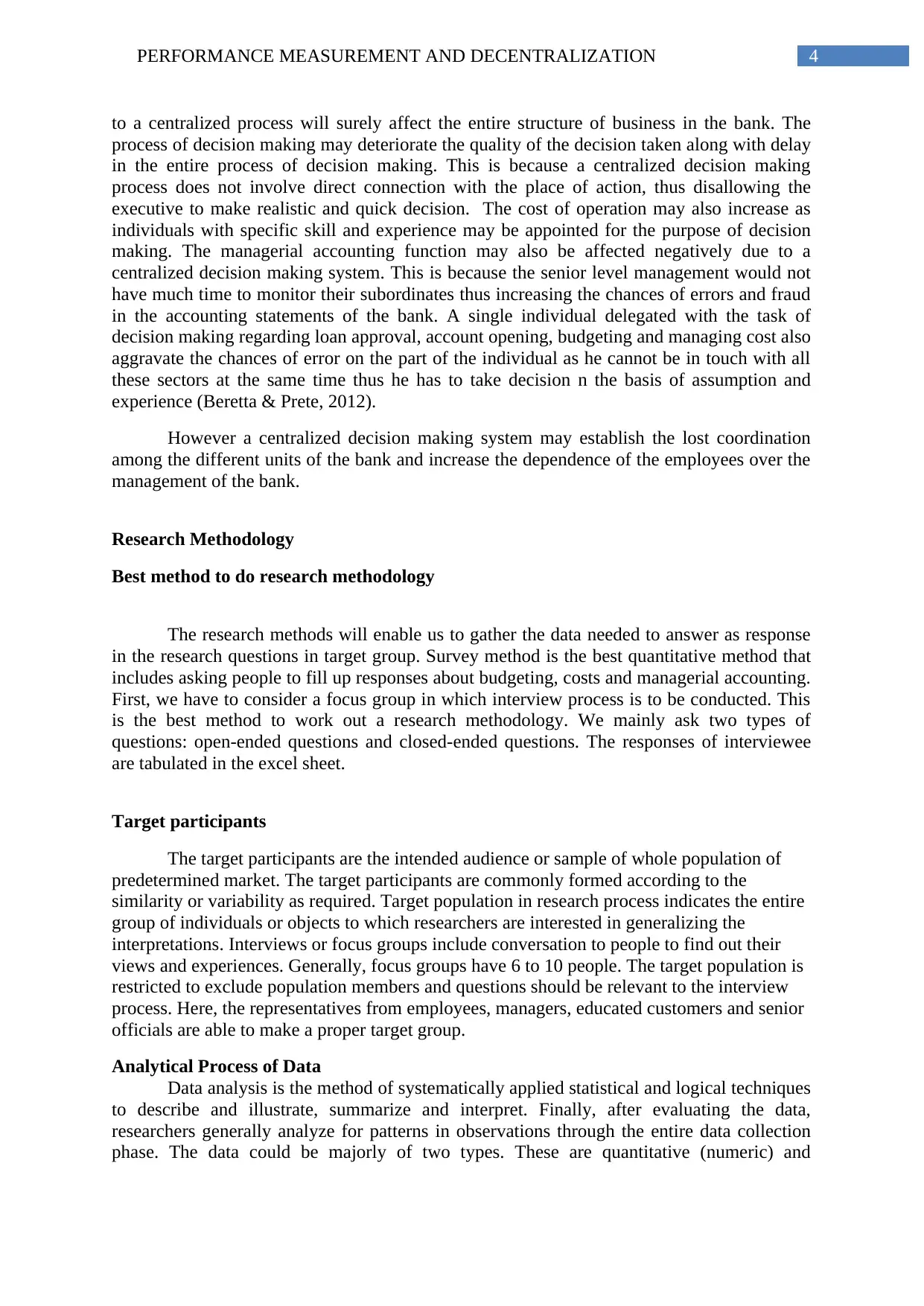
4PERFORMANCE MEASUREMENT AND DECENTRALIZATION
to a centralized process will surely affect the entire structure of business in the bank. The
process of decision making may deteriorate the quality of the decision taken along with delay
in the entire process of decision making. This is because a centralized decision making
process does not involve direct connection with the place of action, thus disallowing the
executive to make realistic and quick decision. The cost of operation may also increase as
individuals with specific skill and experience may be appointed for the purpose of decision
making. The managerial accounting function may also be affected negatively due to a
centralized decision making system. This is because the senior level management would not
have much time to monitor their subordinates thus increasing the chances of errors and fraud
in the accounting statements of the bank. A single individual delegated with the task of
decision making regarding loan approval, account opening, budgeting and managing cost also
aggravate the chances of error on the part of the individual as he cannot be in touch with all
these sectors at the same time thus he has to take decision n the basis of assumption and
experience (Beretta & Prete, 2012).
However a centralized decision making system may establish the lost coordination
among the different units of the bank and increase the dependence of the employees over the
management of the bank.
Research Methodology
Best method to do research methodology
The research methods will enable us to gather the data needed to answer as response
in the research questions in target group. Survey method is the best quantitative method that
includes asking people to fill up responses about budgeting, costs and managerial accounting.
First, we have to consider a focus group in which interview process is to be conducted. This
is the best method to work out a research methodology. We mainly ask two types of
questions: open-ended questions and closed-ended questions. The responses of interviewee
are tabulated in the excel sheet.
Target participants
The target participants are the intended audience or sample of whole population of
predetermined market. The target participants are commonly formed according to the
similarity or variability as required. Target population in research process indicates the entire
group of individuals or objects to which researchers are interested in generalizing the
interpretations. Interviews or focus groups include conversation to people to find out their
views and experiences. Generally, focus groups have 6 to 10 people. The target population is
restricted to exclude population members and questions should be relevant to the interview
process. Here, the representatives from employees, managers, educated customers and senior
officials are able to make a proper target group.
Analytical Process of Data
Data analysis is the method of systematically applied statistical and logical techniques
to describe and illustrate, summarize and interpret. Finally, after evaluating the data,
researchers generally analyze for patterns in observations through the entire data collection
phase. The data could be majorly of two types. These are quantitative (numeric) and
to a centralized process will surely affect the entire structure of business in the bank. The
process of decision making may deteriorate the quality of the decision taken along with delay
in the entire process of decision making. This is because a centralized decision making
process does not involve direct connection with the place of action, thus disallowing the
executive to make realistic and quick decision. The cost of operation may also increase as
individuals with specific skill and experience may be appointed for the purpose of decision
making. The managerial accounting function may also be affected negatively due to a
centralized decision making system. This is because the senior level management would not
have much time to monitor their subordinates thus increasing the chances of errors and fraud
in the accounting statements of the bank. A single individual delegated with the task of
decision making regarding loan approval, account opening, budgeting and managing cost also
aggravate the chances of error on the part of the individual as he cannot be in touch with all
these sectors at the same time thus he has to take decision n the basis of assumption and
experience (Beretta & Prete, 2012).
However a centralized decision making system may establish the lost coordination
among the different units of the bank and increase the dependence of the employees over the
management of the bank.
Research Methodology
Best method to do research methodology
The research methods will enable us to gather the data needed to answer as response
in the research questions in target group. Survey method is the best quantitative method that
includes asking people to fill up responses about budgeting, costs and managerial accounting.
First, we have to consider a focus group in which interview process is to be conducted. This
is the best method to work out a research methodology. We mainly ask two types of
questions: open-ended questions and closed-ended questions. The responses of interviewee
are tabulated in the excel sheet.
Target participants
The target participants are the intended audience or sample of whole population of
predetermined market. The target participants are commonly formed according to the
similarity or variability as required. Target population in research process indicates the entire
group of individuals or objects to which researchers are interested in generalizing the
interpretations. Interviews or focus groups include conversation to people to find out their
views and experiences. Generally, focus groups have 6 to 10 people. The target population is
restricted to exclude population members and questions should be relevant to the interview
process. Here, the representatives from employees, managers, educated customers and senior
officials are able to make a proper target group.
Analytical Process of Data
Data analysis is the method of systematically applied statistical and logical techniques
to describe and illustrate, summarize and interpret. Finally, after evaluating the data,
researchers generally analyze for patterns in observations through the entire data collection
phase. The data could be majorly of two types. These are quantitative (numeric) and
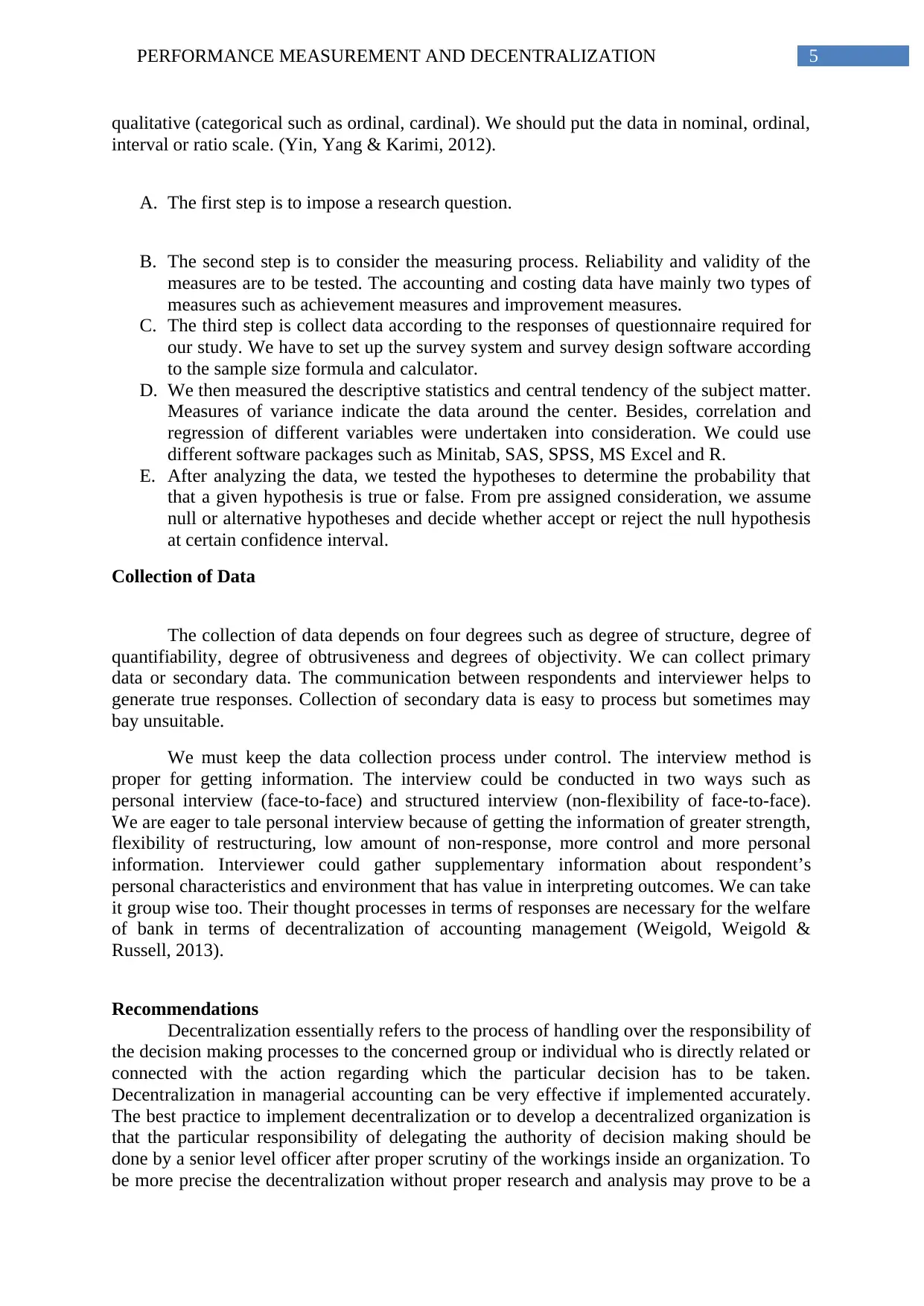
5PERFORMANCE MEASUREMENT AND DECENTRALIZATION
qualitative (categorical such as ordinal, cardinal). We should put the data in nominal, ordinal,
interval or ratio scale. (Yin, Yang & Karimi, 2012).
A. The first step is to impose a research question.
B. The second step is to consider the measuring process. Reliability and validity of the
measures are to be tested. The accounting and costing data have mainly two types of
measures such as achievement measures and improvement measures.
C. The third step is collect data according to the responses of questionnaire required for
our study. We have to set up the survey system and survey design software according
to the sample size formula and calculator.
D. We then measured the descriptive statistics and central tendency of the subject matter.
Measures of variance indicate the data around the center. Besides, correlation and
regression of different variables were undertaken into consideration. We could use
different software packages such as Minitab, SAS, SPSS, MS Excel and R.
E. After analyzing the data, we tested the hypotheses to determine the probability that
that a given hypothesis is true or false. From pre assigned consideration, we assume
null or alternative hypotheses and decide whether accept or reject the null hypothesis
at certain confidence interval.
Collection of Data
The collection of data depends on four degrees such as degree of structure, degree of
quantifiability, degree of obtrusiveness and degrees of objectivity. We can collect primary
data or secondary data. The communication between respondents and interviewer helps to
generate true responses. Collection of secondary data is easy to process but sometimes may
bay unsuitable.
We must keep the data collection process under control. The interview method is
proper for getting information. The interview could be conducted in two ways such as
personal interview (face-to-face) and structured interview (non-flexibility of face-to-face).
We are eager to tale personal interview because of getting the information of greater strength,
flexibility of restructuring, low amount of non-response, more control and more personal
information. Interviewer could gather supplementary information about respondent’s
personal characteristics and environment that has value in interpreting outcomes. We can take
it group wise too. Their thought processes in terms of responses are necessary for the welfare
of bank in terms of decentralization of accounting management (Weigold, Weigold &
Russell, 2013).
Recommendations
Decentralization essentially refers to the process of handling over the responsibility of
the decision making processes to the concerned group or individual who is directly related or
connected with the action regarding which the particular decision has to be taken.
Decentralization in managerial accounting can be very effective if implemented accurately.
The best practice to implement decentralization or to develop a decentralized organization is
that the particular responsibility of delegating the authority of decision making should be
done by a senior level officer after proper scrutiny of the workings inside an organization. To
be more precise the decentralization without proper research and analysis may prove to be a
qualitative (categorical such as ordinal, cardinal). We should put the data in nominal, ordinal,
interval or ratio scale. (Yin, Yang & Karimi, 2012).
A. The first step is to impose a research question.
B. The second step is to consider the measuring process. Reliability and validity of the
measures are to be tested. The accounting and costing data have mainly two types of
measures such as achievement measures and improvement measures.
C. The third step is collect data according to the responses of questionnaire required for
our study. We have to set up the survey system and survey design software according
to the sample size formula and calculator.
D. We then measured the descriptive statistics and central tendency of the subject matter.
Measures of variance indicate the data around the center. Besides, correlation and
regression of different variables were undertaken into consideration. We could use
different software packages such as Minitab, SAS, SPSS, MS Excel and R.
E. After analyzing the data, we tested the hypotheses to determine the probability that
that a given hypothesis is true or false. From pre assigned consideration, we assume
null or alternative hypotheses and decide whether accept or reject the null hypothesis
at certain confidence interval.
Collection of Data
The collection of data depends on four degrees such as degree of structure, degree of
quantifiability, degree of obtrusiveness and degrees of objectivity. We can collect primary
data or secondary data. The communication between respondents and interviewer helps to
generate true responses. Collection of secondary data is easy to process but sometimes may
bay unsuitable.
We must keep the data collection process under control. The interview method is
proper for getting information. The interview could be conducted in two ways such as
personal interview (face-to-face) and structured interview (non-flexibility of face-to-face).
We are eager to tale personal interview because of getting the information of greater strength,
flexibility of restructuring, low amount of non-response, more control and more personal
information. Interviewer could gather supplementary information about respondent’s
personal characteristics and environment that has value in interpreting outcomes. We can take
it group wise too. Their thought processes in terms of responses are necessary for the welfare
of bank in terms of decentralization of accounting management (Weigold, Weigold &
Russell, 2013).
Recommendations
Decentralization essentially refers to the process of handling over the responsibility of
the decision making processes to the concerned group or individual who is directly related or
connected with the action regarding which the particular decision has to be taken.
Decentralization in managerial accounting can be very effective if implemented accurately.
The best practice to implement decentralization or to develop a decentralized organization is
that the particular responsibility of delegating the authority of decision making should be
done by a senior level officer after proper scrutiny of the workings inside an organization. To
be more precise the decentralization without proper research and analysis may prove to be a
⊘ This is a preview!⊘
Do you want full access?
Subscribe today to unlock all pages.

Trusted by 1+ million students worldwide
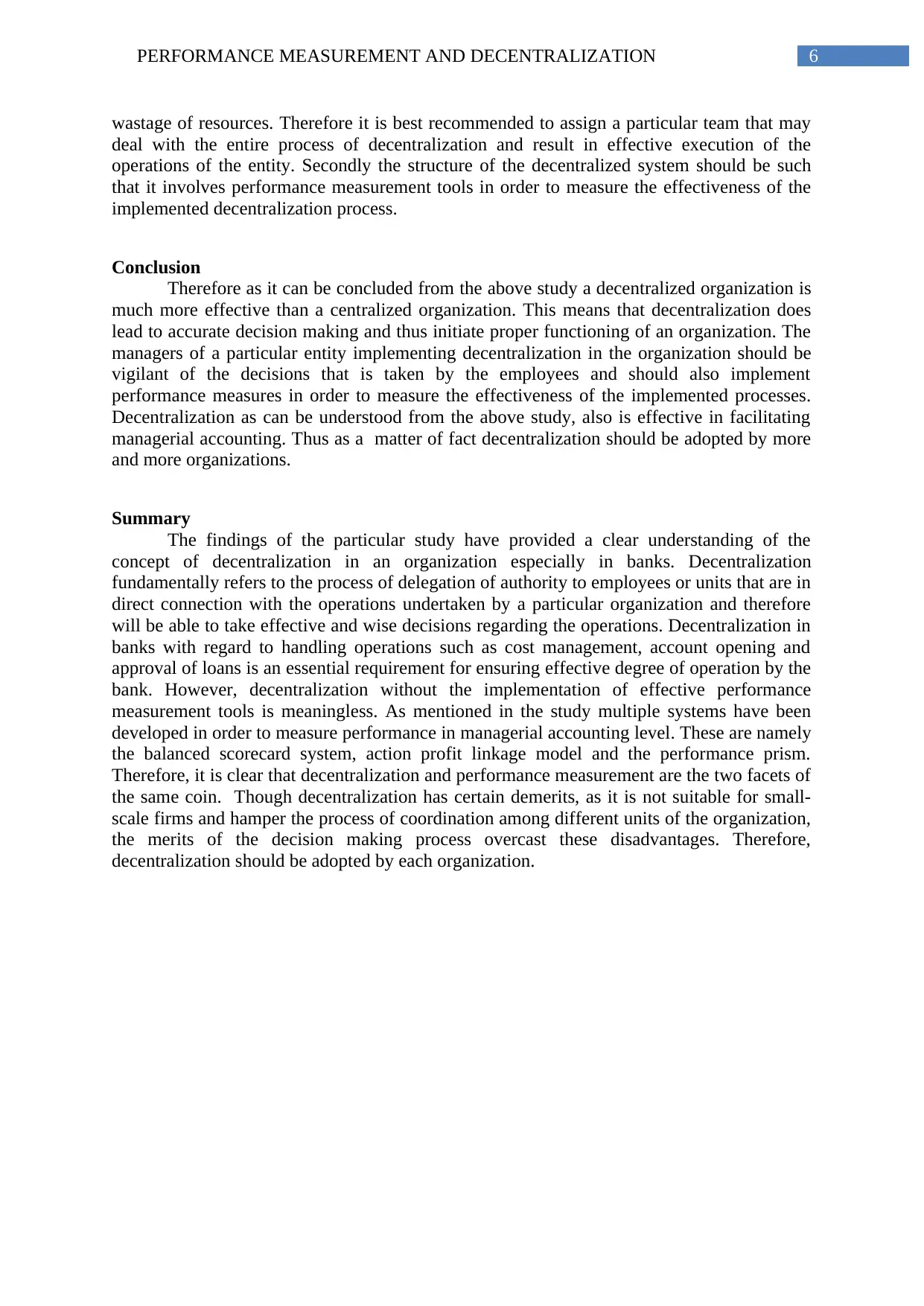
6PERFORMANCE MEASUREMENT AND DECENTRALIZATION
wastage of resources. Therefore it is best recommended to assign a particular team that may
deal with the entire process of decentralization and result in effective execution of the
operations of the entity. Secondly the structure of the decentralized system should be such
that it involves performance measurement tools in order to measure the effectiveness of the
implemented decentralization process.
Conclusion
Therefore as it can be concluded from the above study a decentralized organization is
much more effective than a centralized organization. This means that decentralization does
lead to accurate decision making and thus initiate proper functioning of an organization. The
managers of a particular entity implementing decentralization in the organization should be
vigilant of the decisions that is taken by the employees and should also implement
performance measures in order to measure the effectiveness of the implemented processes.
Decentralization as can be understood from the above study, also is effective in facilitating
managerial accounting. Thus as a matter of fact decentralization should be adopted by more
and more organizations.
Summary
The findings of the particular study have provided a clear understanding of the
concept of decentralization in an organization especially in banks. Decentralization
fundamentally refers to the process of delegation of authority to employees or units that are in
direct connection with the operations undertaken by a particular organization and therefore
will be able to take effective and wise decisions regarding the operations. Decentralization in
banks with regard to handling operations such as cost management, account opening and
approval of loans is an essential requirement for ensuring effective degree of operation by the
bank. However, decentralization without the implementation of effective performance
measurement tools is meaningless. As mentioned in the study multiple systems have been
developed in order to measure performance in managerial accounting level. These are namely
the balanced scorecard system, action profit linkage model and the performance prism.
Therefore, it is clear that decentralization and performance measurement are the two facets of
the same coin. Though decentralization has certain demerits, as it is not suitable for small-
scale firms and hamper the process of coordination among different units of the organization,
the merits of the decision making process overcast these disadvantages. Therefore,
decentralization should be adopted by each organization.
wastage of resources. Therefore it is best recommended to assign a particular team that may
deal with the entire process of decentralization and result in effective execution of the
operations of the entity. Secondly the structure of the decentralized system should be such
that it involves performance measurement tools in order to measure the effectiveness of the
implemented decentralization process.
Conclusion
Therefore as it can be concluded from the above study a decentralized organization is
much more effective than a centralized organization. This means that decentralization does
lead to accurate decision making and thus initiate proper functioning of an organization. The
managers of a particular entity implementing decentralization in the organization should be
vigilant of the decisions that is taken by the employees and should also implement
performance measures in order to measure the effectiveness of the implemented processes.
Decentralization as can be understood from the above study, also is effective in facilitating
managerial accounting. Thus as a matter of fact decentralization should be adopted by more
and more organizations.
Summary
The findings of the particular study have provided a clear understanding of the
concept of decentralization in an organization especially in banks. Decentralization
fundamentally refers to the process of delegation of authority to employees or units that are in
direct connection with the operations undertaken by a particular organization and therefore
will be able to take effective and wise decisions regarding the operations. Decentralization in
banks with regard to handling operations such as cost management, account opening and
approval of loans is an essential requirement for ensuring effective degree of operation by the
bank. However, decentralization without the implementation of effective performance
measurement tools is meaningless. As mentioned in the study multiple systems have been
developed in order to measure performance in managerial accounting level. These are namely
the balanced scorecard system, action profit linkage model and the performance prism.
Therefore, it is clear that decentralization and performance measurement are the two facets of
the same coin. Though decentralization has certain demerits, as it is not suitable for small-
scale firms and hamper the process of coordination among different units of the organization,
the merits of the decision making process overcast these disadvantages. Therefore,
decentralization should be adopted by each organization.
Paraphrase This Document
Need a fresh take? Get an instant paraphrase of this document with our AI Paraphraser
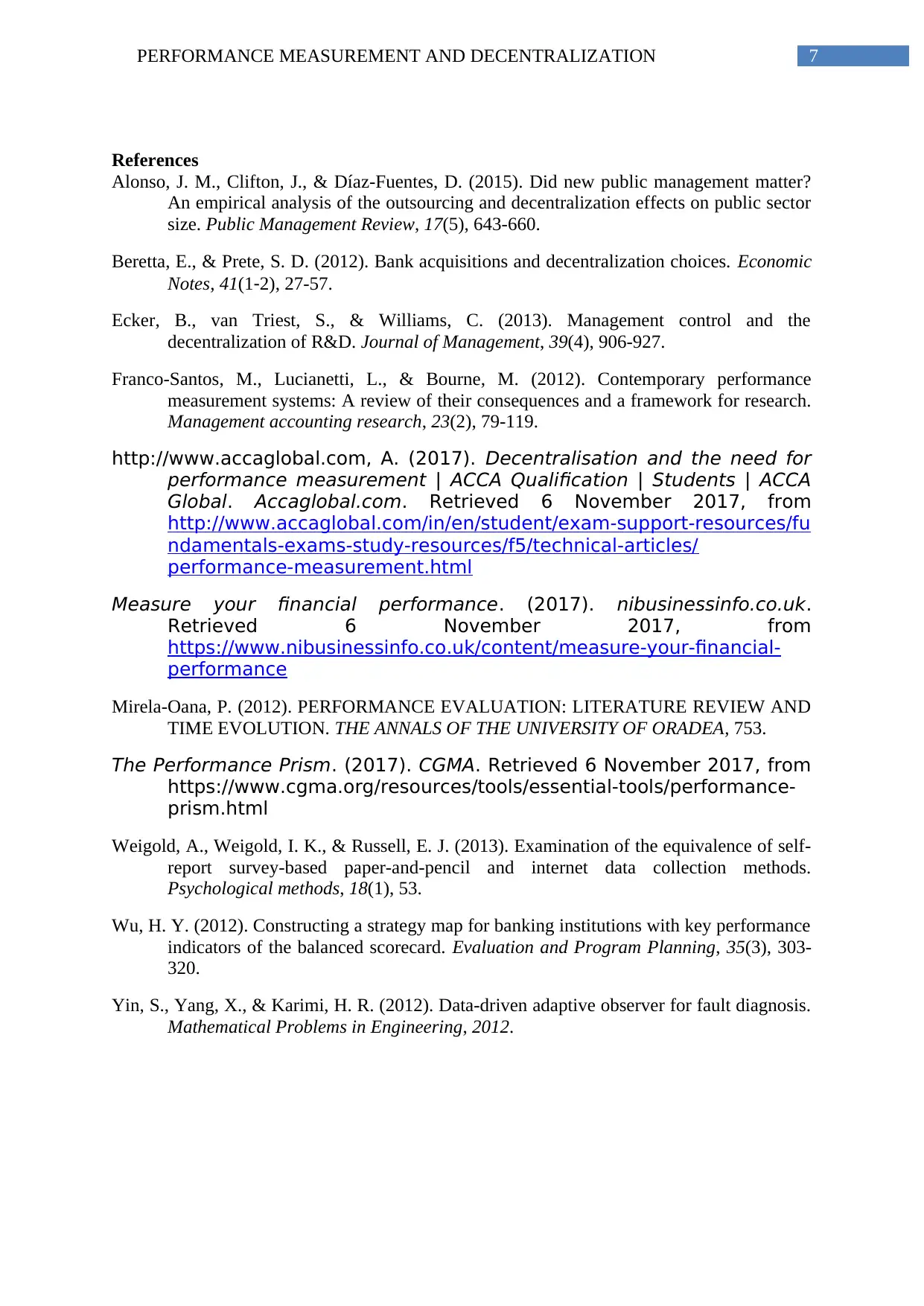
7PERFORMANCE MEASUREMENT AND DECENTRALIZATION
References
Alonso, J. M., Clifton, J., & Díaz-Fuentes, D. (2015). Did new public management matter?
An empirical analysis of the outsourcing and decentralization effects on public sector
size. Public Management Review, 17(5), 643-660.
Beretta, E., & Prete, S. D. (2012). Bank acquisitions and decentralization choices. Economic
Notes, 41(1‐2), 27-57.
Ecker, B., van Triest, S., & Williams, C. (2013). Management control and the
decentralization of R&D. Journal of Management, 39(4), 906-927.
Franco-Santos, M., Lucianetti, L., & Bourne, M. (2012). Contemporary performance
measurement systems: A review of their consequences and a framework for research.
Management accounting research, 23(2), 79-119.
http://www.accaglobal.com, A. (2017). Decentralisation and the need for
performance measurement | ACCA Qualification | Students | ACCA
Global. Accaglobal.com. Retrieved 6 November 2017, from
http://www.accaglobal.com/in/en/student/exam-support-resources/fu
ndamentals-exams-study-resources/f5/technical-articles/
performance-measurement.html
Measure your financial performance. (2017). nibusinessinfo.co.uk.
Retrieved 6 November 2017, from
https://www.nibusinessinfo.co.uk/content/measure-your-financial-
performance
Mirela-Oana, P. (2012). PERFORMANCE EVALUATION: LITERATURE REVIEW AND
TIME EVOLUTION. THE ANNALS OF THE UNIVERSITY OF ORADEA, 753.
The Performance Prism. (2017). CGMA. Retrieved 6 November 2017, from
https://www.cgma.org/resources/tools/essential-tools/performance-
prism.html
Weigold, A., Weigold, I. K., & Russell, E. J. (2013). Examination of the equivalence of self-
report survey-based paper-and-pencil and internet data collection methods.
Psychological methods, 18(1), 53.
Wu, H. Y. (2012). Constructing a strategy map for banking institutions with key performance
indicators of the balanced scorecard. Evaluation and Program Planning, 35(3), 303-
320.
Yin, S., Yang, X., & Karimi, H. R. (2012). Data-driven adaptive observer for fault diagnosis.
Mathematical Problems in Engineering, 2012.
References
Alonso, J. M., Clifton, J., & Díaz-Fuentes, D. (2015). Did new public management matter?
An empirical analysis of the outsourcing and decentralization effects on public sector
size. Public Management Review, 17(5), 643-660.
Beretta, E., & Prete, S. D. (2012). Bank acquisitions and decentralization choices. Economic
Notes, 41(1‐2), 27-57.
Ecker, B., van Triest, S., & Williams, C. (2013). Management control and the
decentralization of R&D. Journal of Management, 39(4), 906-927.
Franco-Santos, M., Lucianetti, L., & Bourne, M. (2012). Contemporary performance
measurement systems: A review of their consequences and a framework for research.
Management accounting research, 23(2), 79-119.
http://www.accaglobal.com, A. (2017). Decentralisation and the need for
performance measurement | ACCA Qualification | Students | ACCA
Global. Accaglobal.com. Retrieved 6 November 2017, from
http://www.accaglobal.com/in/en/student/exam-support-resources/fu
ndamentals-exams-study-resources/f5/technical-articles/
performance-measurement.html
Measure your financial performance. (2017). nibusinessinfo.co.uk.
Retrieved 6 November 2017, from
https://www.nibusinessinfo.co.uk/content/measure-your-financial-
performance
Mirela-Oana, P. (2012). PERFORMANCE EVALUATION: LITERATURE REVIEW AND
TIME EVOLUTION. THE ANNALS OF THE UNIVERSITY OF ORADEA, 753.
The Performance Prism. (2017). CGMA. Retrieved 6 November 2017, from
https://www.cgma.org/resources/tools/essential-tools/performance-
prism.html
Weigold, A., Weigold, I. K., & Russell, E. J. (2013). Examination of the equivalence of self-
report survey-based paper-and-pencil and internet data collection methods.
Psychological methods, 18(1), 53.
Wu, H. Y. (2012). Constructing a strategy map for banking institutions with key performance
indicators of the balanced scorecard. Evaluation and Program Planning, 35(3), 303-
320.
Yin, S., Yang, X., & Karimi, H. R. (2012). Data-driven adaptive observer for fault diagnosis.
Mathematical Problems in Engineering, 2012.

8PERFORMANCE MEASUREMENT AND DECENTRALIZATION
Appendices
The questions of the banking survey regarding decentralization of the bank could be-
1. How many branches does the bank have all over the country or state?
2. How many employees and manager level staffs are present in the particular bank?
3. What are the monitor implementation policies of the bank?
4. How is the relation of employee-manager relation according to the interviewee?
5. What are the administrative policies regarding manager evaluation?
6. What are the experiences in years of managers’ individually?
7. Is there a detailed plan for transfer of powers to various branches?
8. Are you ready to accept decentralization of the bank?
9. What are the political boundaries and stakeholders regarding regulation of
decentralization?
10. Would the decentralization of accounting management be transparent and beneficial for
the common people including banking servants?
11. Would the decentralization process be long term beneficiary in case of revenue policy?
12. What is the performance level of the managers in last year?
13. What could be the relation between long term profit of banks and the cost of
decentralization? (Greater or lesser or equal).
Appendices
The questions of the banking survey regarding decentralization of the bank could be-
1. How many branches does the bank have all over the country or state?
2. How many employees and manager level staffs are present in the particular bank?
3. What are the monitor implementation policies of the bank?
4. How is the relation of employee-manager relation according to the interviewee?
5. What are the administrative policies regarding manager evaluation?
6. What are the experiences in years of managers’ individually?
7. Is there a detailed plan for transfer of powers to various branches?
8. Are you ready to accept decentralization of the bank?
9. What are the political boundaries and stakeholders regarding regulation of
decentralization?
10. Would the decentralization of accounting management be transparent and beneficial for
the common people including banking servants?
11. Would the decentralization process be long term beneficiary in case of revenue policy?
12. What is the performance level of the managers in last year?
13. What could be the relation between long term profit of banks and the cost of
decentralization? (Greater or lesser or equal).
⊘ This is a preview!⊘
Do you want full access?
Subscribe today to unlock all pages.

Trusted by 1+ million students worldwide
1 out of 9
Related Documents
Your All-in-One AI-Powered Toolkit for Academic Success.
+13062052269
info@desklib.com
Available 24*7 on WhatsApp / Email
![[object Object]](/_next/static/media/star-bottom.7253800d.svg)
Unlock your academic potential
Copyright © 2020–2026 A2Z Services. All Rights Reserved. Developed and managed by ZUCOL.





